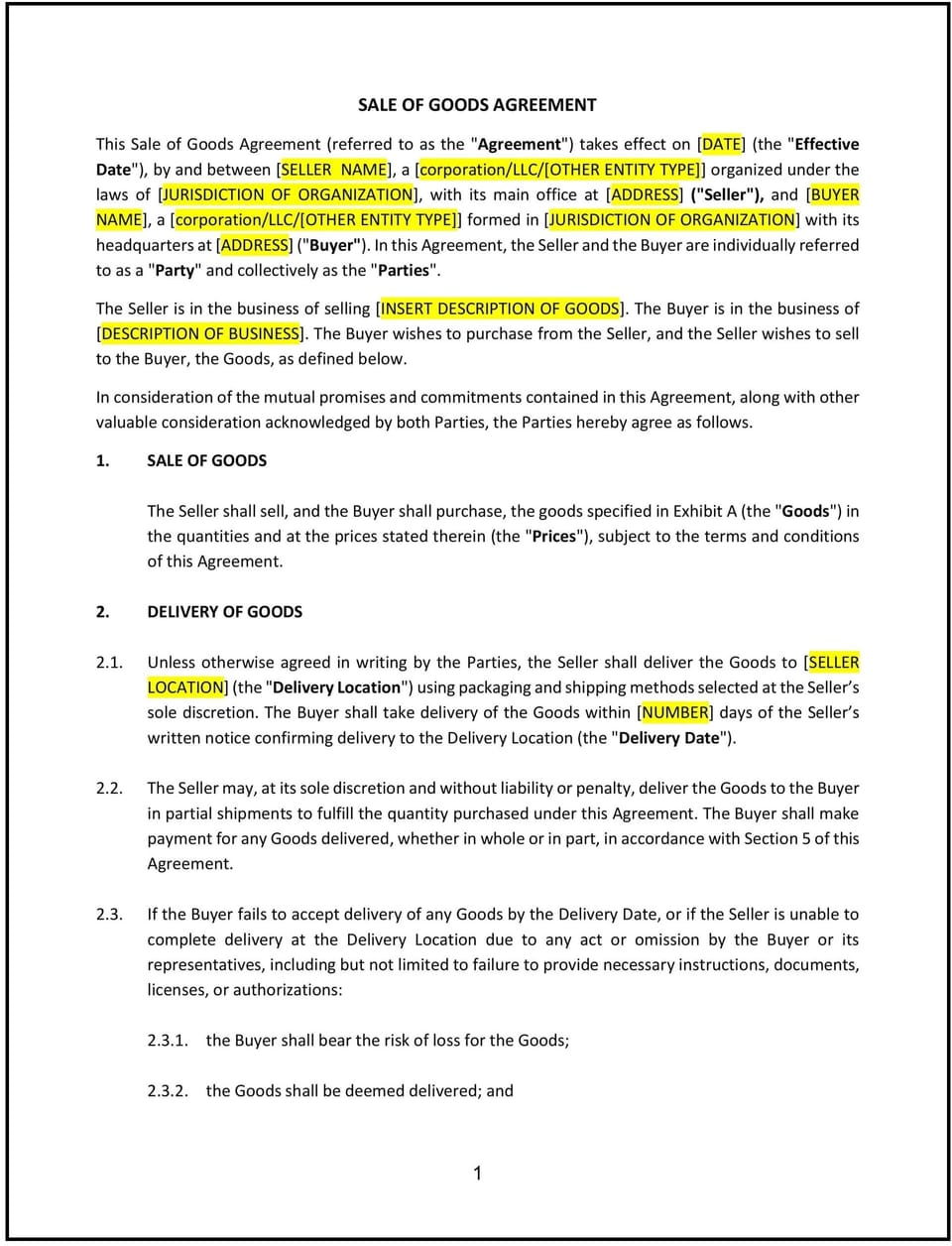Sale of Goods Agreement (Pro-Seller) (New Hampshire): Free template

Sale of Goods Agreement (Pro-Seller) (New Hampshire)
A Sale of Goods Agreement (Pro-Seller) in New Hampshire is a legally binding contract that establishes the terms under which a seller provides goods to a buyer. This agreement protects the seller’s interests by defining payment terms, delivery obligations, risk allocation, and liability limitations. It is widely used in industries such as manufacturing, wholesale distribution, retail, and e-commerce, where businesses engage in frequent transactions involving physical goods.
New Hampshire businesses use this agreement to secure payments, prevent disputes over product quality, and establish enforceable sales terms. New Hampshire follows Uniform Commercial Code (UCC) Article 2, which governs the sale of goods and allows sellers to disclaim certain warranties, enforce payment terms, and set delivery obligations. A well-drafted agreement helps sellers prevent issues related to late payments, product returns, and liability for lost or damaged goods.
For sellers operating in New Hampshire, this agreement provides a structured framework that ensures smooth transactions, reduces financial risks, and protects revenue. While New Hampshire contract law generally upholds clearly drafted agreements, businesses must ensure that their terms comply with UCC provisions and state-specific commercial regulations.
Tips for drafting and maintaining a Sale of Goods Agreement (Pro-Seller) in New Hampshire
- Clearly define the goods being sold, including specifications, quantity, pricing, and acceptable quality standards to prevent disputes.
- Establish payment terms, including required deposits, invoicing timelines, penalties for late payments, and acceptable payment methods. New Hampshire law enforces properly documented payment obligations.
- Specify delivery terms, including shipping responsibilities, risk transfer, and liability for lost or damaged goods. Under New Hampshire UCC Article 2, risk of loss generally passes to the buyer upon delivery unless otherwise stated.
- Limit seller liability by disclaiming implied warranties unless the seller explicitly offers guarantees. New Hampshire law allows sellers to exclude warranties of merchantability and fitness for a particular purpose, provided the disclaimer is clearly stated in writing.
- Include a return and refund policy that specifies whether returns are allowed and under what conditions. New Hampshire law permits sellers to establish "no return" policies, provided they are clearly disclosed to the buyer.
- Incorporate a force majeure clause to protect the seller from liability if unforeseen events, such as natural disasters or supply chain disruptions, delay or prevent fulfillment of the agreement.
Frequently asked questions (FAQs)
Q: What should New Hampshire businesses include in a Sale of Goods Agreement (Pro-Seller)?
A: Businesses should outline product descriptions, payment terms, delivery obligations, warranty disclaimers, risk of loss terms, and liability limitations to protect the seller.
Q: How does a Sale of Goods Agreement (Pro-Seller) benefit New Hampshire sellers?
A: It protects sellers from disputes over product quality, late payments, and liability while ensuring that payment and delivery terms are legally enforceable.
Q: Are disclaimers of warranties enforceable in New Hampshire?
A: Yes, under New Hampshire UCC Article 2, sellers can disclaim implied warranties, such as the warranty of merchantability and fitness for a particular purpose, as long as the disclaimer is clearly stated in writing.
Q: What happens if a buyer refuses to pay under a Sale of Goods Agreement in New Hampshire?
A: The seller can enforce payment terms through legal action, including contract damages, repossession of goods, or interest penalties on late payments.
Q: How should New Hampshire sellers handle disputes under a Sale of Goods Agreement?
A: Sellers should include a dispute resolution clause specifying whether disputes will be handled through arbitration, mediation, or New Hampshire courts.
Q: Does New Hampshire require sales tax on goods sold under this agreement?
A: No, New Hampshire does not impose a general state sales tax, but businesses should confirm whether specific local taxes or industry-specific obligations apply.
Q: Can a seller refuse returns under a Sale of Goods Agreement in New Hampshire?
A: Yes, the agreement can specify no returns or limited returns, as long as this policy is clearly disclosed to the buyer in the contract.
This article contains general legal information and does not contain legal advice. Cobrief is not a law firm or a substitute for an attorney or law firm. The law is complex and changes often. For legal advice, please ask a lawyer.


